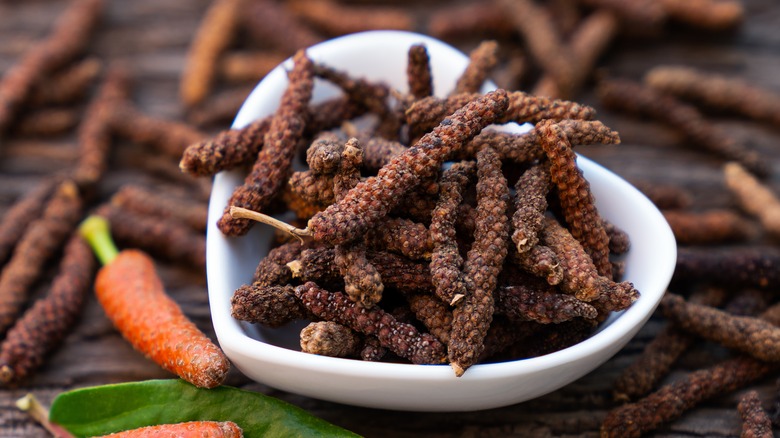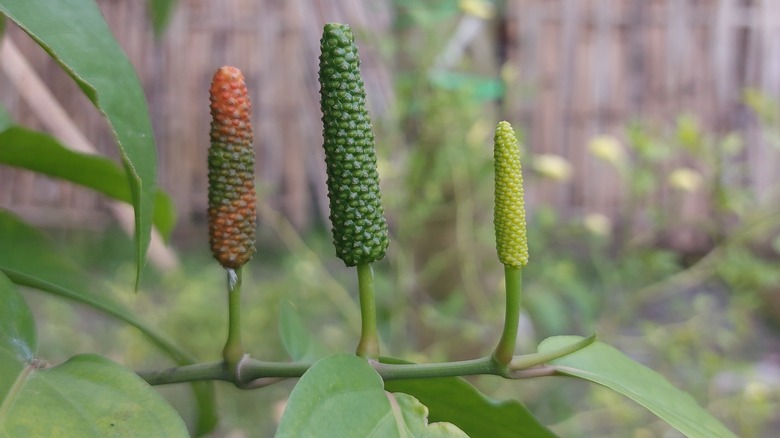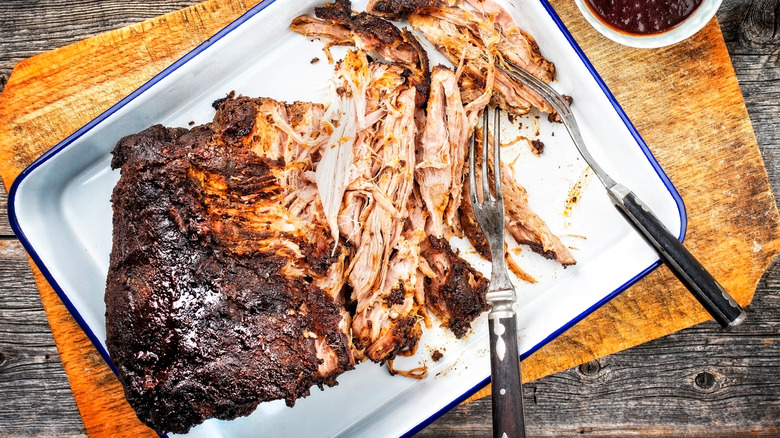Try Pairing Your Barbecued Meats With Long Peppers
We're all familiar with Piper nigrum — the little black peppercorns we grind over, well, everything. Did you know that this spice has an even more venerable cousin, Piper longum (sometimes called pippali), commonly known as long pepper? They're both fruits that are dried and often ground for use as a spice; both contain the compound piperine, which gives them their gorgeous pungency. Long peppers, though, have a sweet baking-spice aroma, a more citrusy flavor than their cousin, and quite a bit more of a spicy kick. This makes them an excellent option for your next barbecue sauce or dry rub.
Unlike black peppercorns, long peppers aren't round. Instead, they resemble the dangly tree flowers called catkins. However, though they are flowers, long peppers come from a creeping vine native to India's northeastern state of Meghalaya. Each flower spike contains tiny fruits about the size of a poppy seed, and are typically sun-dried after harvesting before being used whole or ground.
Long pepper background and flavor profile
Long peppers were initially known for their medicinal qualities in the ancient Indian system of Ayurveda. They were (and still are) used to help treat mild respiratory and digestive disorders as well as a sexual stimulant. Once it made its way into the Mediterranean, the long pepper became more valued as a spice in ancient Rome than peppercorns — to the extent that it was considered a luxury item. Long peppers maintained this exalted status until the Middle Ages.
Why was it so beloved? For starters, long pepper flavor is more complex than a peppercorn, although the two share the same peppery, pungent bite. Their fragrance is evocative of cardamom, ginger, and nutmeg; their citrusy, woody flavor contains notes of warm cinnamon and camphor, the latter making it reminiscent of a Sichuan pepper. Then the long pepper offers a lingering finish with a definitive kick. Are you ready to cook with these things or not?
Pairing long peppers with barbecued meats
Now let's fire up the grill and contemplate long peppers. Generally, they should be substituted for black pepper in dry rubs and marinades. Since they're still used to make pickles in India, think about a dish that could use the long pepper's fiery astringency. We think a good start would be as part of a dry rub for an old-school Southern pork barbecue. Combine ground long peppers with brown sugar, Kosher salt, celery salt, garlic and onion powders, ground mustard, and paprika, then rub a generous amount of this seasoning mix over a Boston butt. Smoke low and slow over chunks of hickory wood until its internal temperature reaches 185 degrees Fahrenheit.
We'd also showcase our new peppery friends in a marinade for a garlic and long pepper grilled shrimp recipe, along with a fresh red pepper (a Fresno will do nicely), lime juice, salt, and avocado oil. Whisk everything together, add your peeled shrimp, thread on skewers, and grill. Back in the kitchen, toss whole long peppers into soups or lentil dishes to add a familiar-yet-not-quite-identifiable finishing touch.


